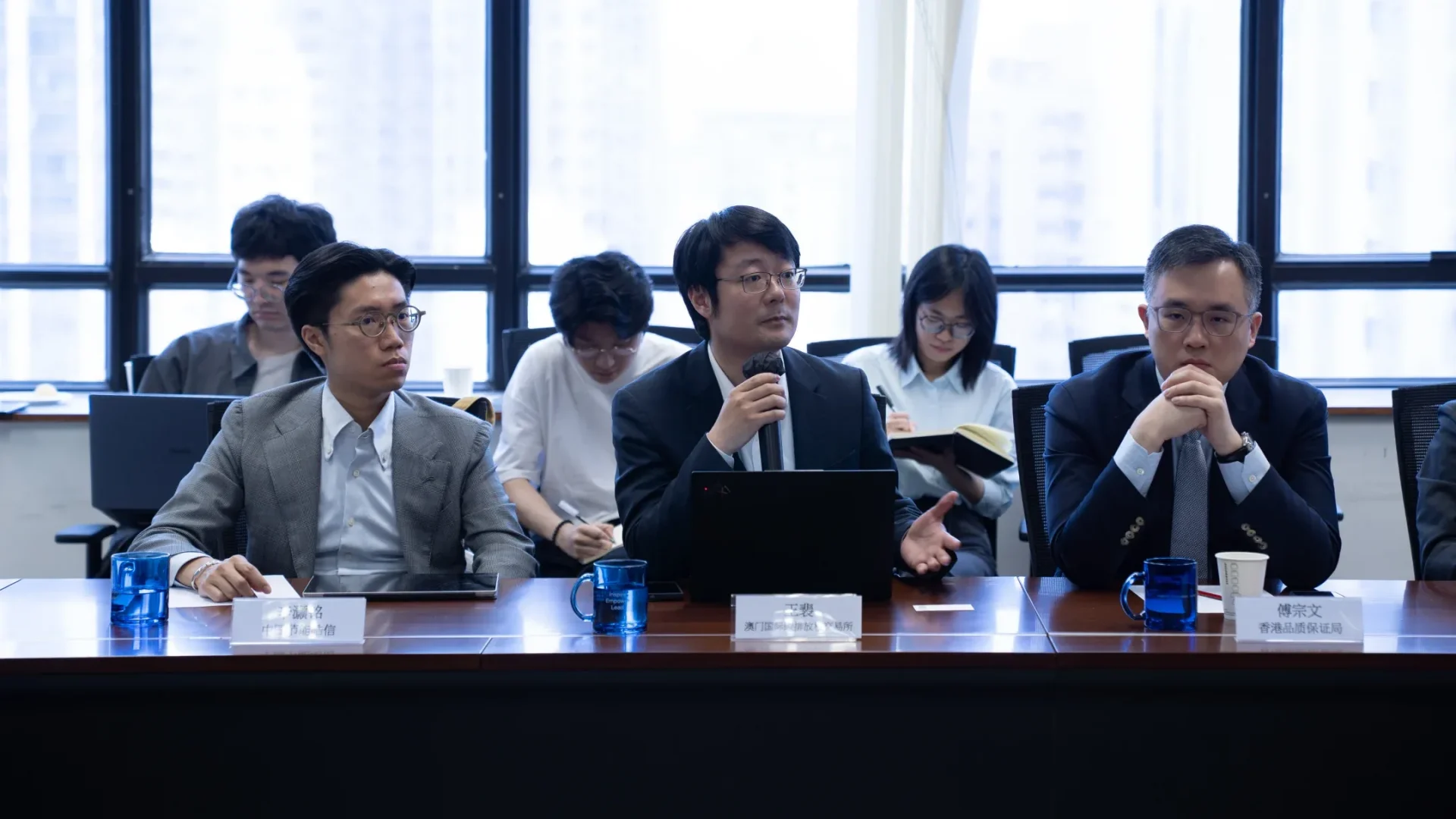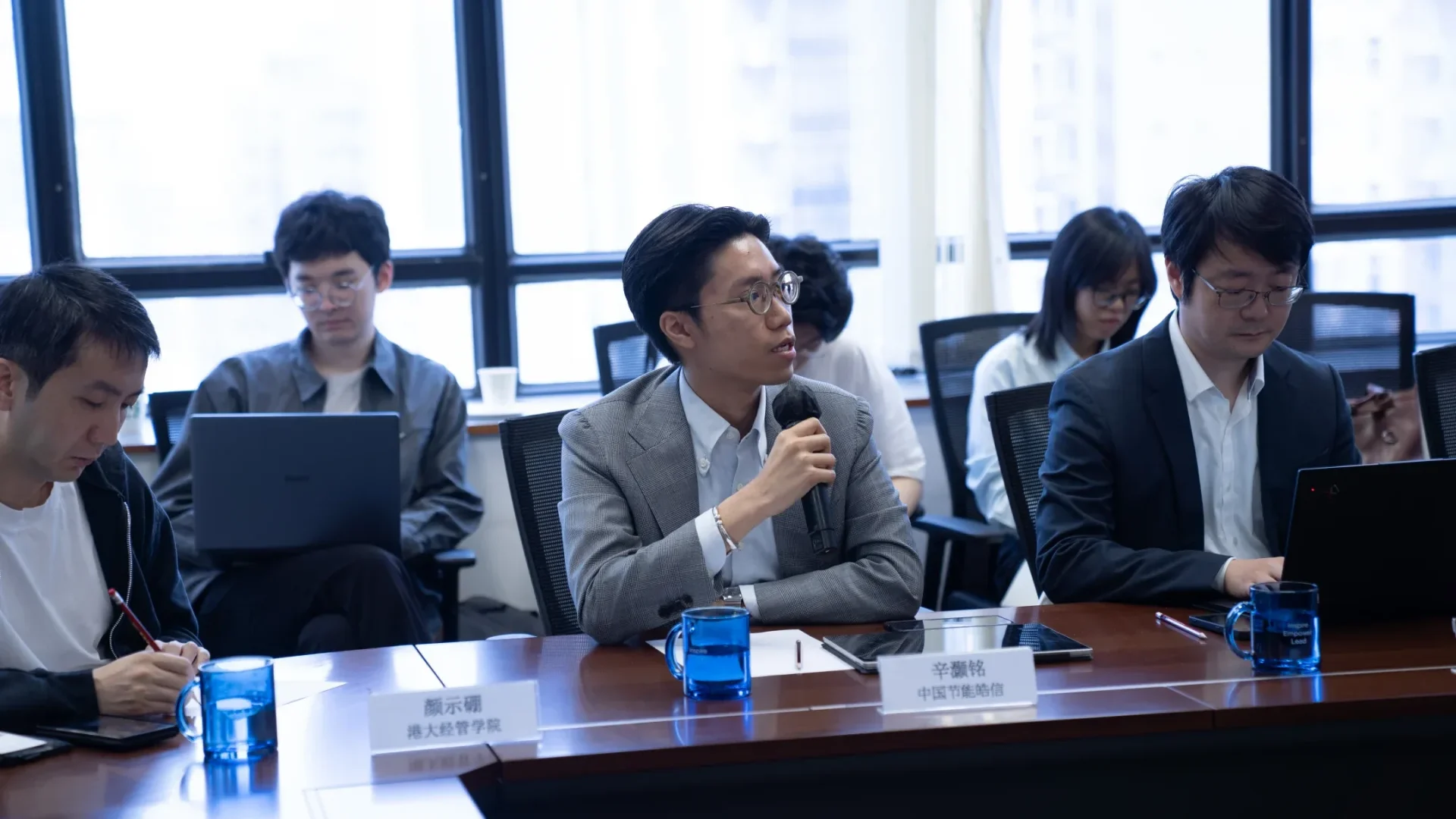
HKU Jockey Club Enterprise Sustainability Global Research Institute
World-Class Hub for Sustainability
Roundtable Reflections:
2025 Bay Area Sustainability Blueprint: Decoding Sustainability Data, AI Innovations and Practical Implementations
2025 Bay Area Sustainability Blueprint: Decoding Sustainability Data, AI Innovations and Practical Implementations
On April 16, 2025, jointly organised by our institute and Caijing Dushu, the closed-door workshop “2025 Bay Area Sustainability Blueprint: Decoding Sustainability Data, AI Innovations and Practical Implementations” was successfully held at the main campus of the University of Hong Kong.
Building on the practical challenges and pain points identified in the previous session, for this time, the workshop brought together representatives from both internationally and domestically renowned data service providers, and third-party institutions, alongside the scholars from our institute, to explore pathways for enhancing the value of sustainability data products and the innovative applications of AI technology. This discussion delved deeply into the impact of geopolitical factors and the anti-ESG movement on rating methodologies, as well as the breakthroughs and limitations of AI in ESG data products R&D and practices.















Issues Addressed
- Will shifting geopolitics (e.g., Trump effect) reshape existing ESG rating systems? (e.g., altering indicator selection or weightings adjustments)
- Does anti-ESG sentiment hinder ESG data adoption?
- What is the future market demand for sustainability data? Industry observations vs. Academic perspectives
- How to rate companies with diversified business lines?
- Filling “N/A fields” in corporate ESG disclosures – solutions?
- AI’s role in ESG disclosure: catalyst or cosmetic?
- Can AI fully automate ESG data collection or verification?
- Does AI-generated ESG reporting make greenwashing easier?
- AI in ESG data today: practical applications & untapped potential?
Guests Highlights
Geopolitics, Anti-ESG Movements & Methodology Adjustments

Dequan Wang
Founder & Chief Executive Officer of Governance Solutions Group
Current market attention is increasingly shifting toward specific indicators and tailored analyses that reflect a company’s adaptability in a changing global landscape, supply chain resilience, and climate preparedness. It is important to adapt to the characteristics of different industries and different demands from investors.
Geopolitical shocks have a significant impact on specific industries, such as those with high carbon emissions or heavy reliance on overseas markets. This necessitates dynamic adjustments to relevant indicators and their weightings in ESG rating systems to accurately reflect risks.

Shuangbo Shen
Director of ESG Ratings and Data Center at China Cheng Xin,
Chief Operating Officer of
China Cheng Xin Green Finance International (CCXGFI) Co., Ltd

Aaron Wei
Director of ESG Business Management
at Fitch Ratings
Amid a complex environment, the core of sustainable rating methodologies should remain relatively stable, focusing on delivering clear, comparable, and pricing-anchored assessments, to provide consistent and transparent conclusions.
As long as carbon emissions persist, climate risk remains. Despite the US government’s reversal on climate policies, physical risks exist, objectively. And that means the lasting demand for data, assessments and ratings.

Cheng Bi
Chief Technology Officer
& Co-founder of Youjivest Technology
Market Trend and Emerging Data Needs

Zongwen Fu
Assistant General Manager of the Hong Kong Quality Assurance Agency
Market demand is shifting from single, finalised rating scores towards diversified data products and solutions. Investors and companies are increasingly focusing on the accessibility of underlying data, the transparency of methodologies, and in-depth analytical capabilities for specific themes (e.g., climate risk, sustainability strategies).
As the application of sustainability information deepens, corporate data governance capabilities have become critical. There is significant growth in demand for data governance tools and professional services that support internal management and meet complex external disclosure requirements (e.g., ISSB, ESRS).

Haoming Xin
Director of Sustainability of CECEP Environmental Consulting Group Limited

Fei Wang
Marketing Director of the Macao International Carbon Emission Exchange
Current challenges in carbon trading include verification and validation of carbon credit quality. The US withdrawal from the Paris Agreement has accelerated demand in voluntary carbon markets for high-quality credit products, such as carbon removals. Regarding carbon market allocation mechanisms, the international approach adopts a cap-and-trade system, while China employs a dynamic carbon intensity-based allocation model. This reflects differing pathways in climate issues between developed and developing nations, highlighting the need to monitor risks arising from divergent practices.
AI Technology Applications, Challenges, and Breakthroughs
Data coverage, accuracy, timeliness, and verifiability remain the key bottlenecks in ESG data. Regulatory mandatory disclosure requirements and AI adoption are critical drivers for improving both the quantity and quality of data supply.

Xiangfeng Liu
Founder & Chief Executive Officer of QuantData

Hailiang Chen
Director of the Artificial Intelligence Research Institute, Assistant Dean (Taught Postgraduate), Professor in Innovation and Information Management at the HKU Business School, Affiliated researcher in HKU Jockey Club Enterprise Sustainability Global Research Institute
AI’s potential in financial analysis coexists with its current limitations. As an assistive tool, AI can efficiently process sustainability-related data and conduct sentiment monitoring. In legal research, AI could enable rapid retrieval of civil case rulings. However, in high-stakes areas, such as investment decision-making and regulatory compliance, AI-generated data biases could pose significant risks and should be adopted with precaution.
Key Takeaways
Balancing Consistency and Agility in ESG Ratings Methodology
The trade-off between consistency and agile adjustments in ESG ratings is crucial. While ESG metrics and weightings must adapt to external changes, maintaining the long-term consistency of core methodologies is essential. In today’s geopolitical complexity and escalating climate crises, rating agencies should create resilient assessment frameworks that are responsive to external risks and evolving definitions of sustainability. Future ESG data products will need to strategically balance consistency with flexibility, as well as standardization with customization.
Today’s go-to model: AI Enhances Speed, Human Oversight Ensures Quality
AI significantly accelerates tasks like data extraction, processing, preliminary analysis, and report generation, delivering cost and efficiency gains. However, it has limitations in interpreting complex graphics, verifying information authenticity, avoiding tautologies, processing unstructured data, and ensuring accuracy in critical areas. In ESG data applications, AI acts as an efficiency tool, while final validation and quality control are entrusted to experienced professionals.
Bridging academia and industry for sustainable innovation
Academic research can provide rigorous theoretical frameworks, methodological validation, and impact measurements for ESG data, ratings, and indices. Meanwhile, industry offers real-world applications, data feedback, and practical demands, that drive iterative improvements. This relationship—where theoretical advancements inform practice, and real-world challenges refine theory—can be vital for fostering a robust sustainability ecosystem.
We are so delighted to gather industry experts and academia scholars, to share cross-sectoral insights, observations, and innovative approaches. Our institute will also host more thought-provoking events. Stay engaged and we look forward to more people joining us in more fruitful and insightful dialogues!
Closing Remarks
In today’s volatile environment—shaped by geopolitical shifts, the anti-ESG movement, and rapid AI advancements, the development, application, and promotion of sustainability data, ratings, and indices, all face unprecedented challenges, but untapped potential as well. While ESG data products proliferate with diversified market demand, critical questions remain: How can we develop meaningful data products? How do we harness AI’s full potential to empower decision-makers? How can we jointly drive tangible progress in sustainability?
We are so delighted to gather industry experts and academia scholars, to share cross-sectoral insights, observations, and innovative approaches. Our institute will also host more thought-provoking events. Stay engaged and we look forward to more people joining us in more fruitful and insightful dialogues!
About the Event
The Greater Bay Area emerges as a key player in the global ESG landscape by advancing sustainable development through multi-sector collaboration, green finance innovation, and regional integration.
Our Greater Bay Area development blueprint theme will feature a series of events, inviting distinguished academics and industry guests to discuss the practical issues encountered in promoting sustainable development in the Greater Bay Area through seminars, closed-door discussions, etc. Building on the practical challenges and pain points identified in the previous session, this time, we brought together experts from both internationally and domestically renowned data service providers, and third-party institutions, alongside the scholars from our institute, to explore pathways for enhancing the value of sustainability data products and the innovative applications of AI technology.